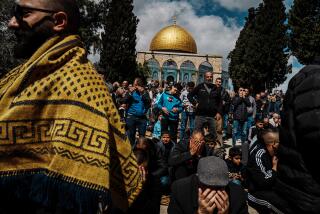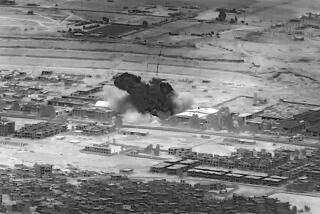Attacks during Ramadan fall despite threats
BAGHDAD — The number of attacks during the four weeks encompassing the Muslim holy month of Ramadan was far lower this year than during the same period last year, despite recent threats by insurgents to inflict heavy casualties, according to U.S. officials and independent statistics.
In Iraq, Ramadan began Sept. 13 for Sunnis and Sept. 14 for Shiites, and insurgents struck quickly, killing Sheik Abdul-Sattar abu Risha, the top U.S. ally in the fight against Al Qaeda in Iraq militants in Anbar province. And a suicide bomber killed at least 25 people at a reconciliation meeting between Shiite and Sunni leaders in Diyala province Sept. 24.
Nonetheless, overall violence for the period was down 40% compared with the 2006 Ramadan, and U.S. military deaths fell by half, to 49, according to the U.S. military and icasualties.org, which tracks casualties in Iraq. The Iraqi Ministry of Interior said violence in September, which included two weeks of Ramadan, was at the lowest monthly level of the year.
This year’s Ramadan may have been the least deadly for U.S. troops in Iraq, according to icasualties.org, which lists 98 troop deaths during Ramadan last year, 93 the year before, 104 in 2004, and 88 in 2003.
Civilian deaths amounted to one-fifth of the level in September 2006, according to icasualties.org, although the group said such figures tend to be unreliable.
The Islamic State of Iraq, a Sunni insurgent coalition that includes Al Qaeda in Iraq, issued a statement in mid-September saying it would launch a Ramadan offensive through Oct. 22.
Since the U.S. invasion in 2003, the monthlong period of fasting and religious observation has brought increased attacks, beginning with a rocket fired into the Rashid Hotel in 2003 that did much to dash U.S. hopes of beginning the restoration of public services and returning Iraqi life to normal.
“The volume of attacks were less than last year, probably comparable to 2005,” said Maj. Winfield Danielson, a military spokesman. “It was definitely an improvement over last year.”
Independent experts said the comparatively low level of violence during Ramadan can be attributed to overall security improvements.
“It’s the overall situation, not just Ramadan,” said Joost Hiltermann, an Iraq expert at the International Crisis Group think tank based in Istanbul, Turkey. “Ramadan has been relatively quiet. . . . But last year, the situation was horrendous.”
Scattered violence continued around Iraq on Tuesday, including a car bombing that killed as many as six people in Baghdad and a truck bombing that killed four in Mosul, Iraqi officials said. U.S. security officials disputed the deaths in Baghdad, saying 11 people were injured and none killed.
Gunmen attacked a police checkpoint in southeast Baghdad, killing three policemen and wounding another officer. A roadside bomb targeting an Iraqi police patrol injured three officers near the northern neighborhood of Adhamiya.
Baghdad police also found the bodies of four men, all with gunshot wounds.
Iraqi police said militants fired mortar rounds at a U.S. military base near Balad, 50 miles north of Baghdad. It was not immediately known whether there were casualties.
The U.S. military reported that it had captured 10 suspects with alleged ties to Al Qaeda in Iraq, including a man suspected in several car bombings, another allegedly linked to roadside bomb attacks, and a third man said to be responsible for moving foreign fighters and suicide bombers throughout Iraq.
christian.berthelsen @latimes.com
Times staff writers Usama Redha, Raheem Salman, Wail Alhafith and Alexandra Zavis, and special correspondents throughout Iraq, contributed to this report.
More to Read
Sign up for Essential California
The most important California stories and recommendations in your inbox every morning.
You may occasionally receive promotional content from the Los Angeles Times.










